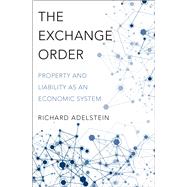There are three basic institutional systems for governing the exchange of property. One is consensual: the exchange of property rights in ordinary markets. The other two, however, are nonconsensual: the involuntary exchange of entitlements in either civil or criminal liability cases.
In The Exchange Order, Richard Adelstein argues that while markets, torts, and criminal justice are ostensibly different constellations of institutions, organizations and individuals, they are remarkably alike. Each governs a particular kind of exchange through a distinctive set of institutions, rules and procedures. They have all evolved over many centuries from the same root, a deep-seated human propensity to communicate with others through trade, to exchange goods for goods and costs for costs as a means of reconciling opposing interests and increasing personal welfare. They perform the same social function, facilitating individually efficient exchanges of rights and compensatory prices, in very different exchange environments that demand very different institutional responses to the problem all three are in place to solve: identifying efficient transfers and seeing that they are completed.
The Exchange Order provides a sweeping historical, comparative, and philosophical analysis of how rights and objects, goods and harms, are exchanged in these apparently very different realms. What unites them is a core norm: take only what you can pay for, and pay for everything you take. In markets free exchange is governed by prices and the willingness to sell or buy. Tort and criminal law apply when consensual exchange is violated. The violation is the non-consensual seizure of entitlements and the payment is a liability price on the taker that compensates the victim for the costs imposed by the taking. Tit for tat, an eye for an eye, is the principle of exchange that unites markets, tort and crime.








